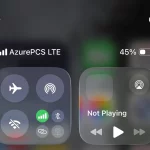Some Three UK Customers Get Working IPv6 Internet Addresses UPDATE

A number of data (mobile broadband) connected users on Three UK’s 4G mobile network have now reported that their connection has been assigned an IPv6 internet address, as well as the usual IPv4. At present this looks to be a limited customer field-trial, which often comes ahead of a major roll-out.
Internet protocol (IP) addresses are a seamless technology that helps to connect your computer/devices with the online world (like an ID number for your connection). At present most people still connect via the old IPv4 addressing standard but those have now been depleted (here) and as such many providers have been steadily moving to introduce “newer” IPv6 addresses.
Sadly the longer form hexadecimal IPv6 addresses are not directly compatible with older IPv4 addresses and so special systems (e.g. dual stack, dual stack lite etc.) have to be implemented in order that the two can be run side-by-side (likely to continue for many years to come). Doing this can present a few cost and development challenges for larger providers.
Advertisement

Some mobile operators, such as EE (BT), have already made the jump but others are still twiddling their thumbs. Until recently Three UK was in the latter camp, although the first signs of change came during spring 2019 when a number of users reported that an IPv6 address had been assigned to their connection, although they didn’t appear able to route traffic through it.
However, the operator seems to be making progress as several people – mostly around London – have now informed ISPreview.co.uk that their 4G connections are being issued with working IPv6 addresses (credits to Joe and Chris). Clearly this isn’t widespread yet as we haven’t seen it on our own service and very few other users have noticed it.
By the looks of it this is either a customer field trial or the early start of a phased rollout across Three UK’s wider mobile network. We’ve asked the operator for a comment and will update when they respond.
UPDATE 14th November 2019
Advertisement
By the looks of it Three UK’s new software-based cloud core network (here) – using systems from Nokia – includes support for IPv6 by default. As such we had been suspecting that the reason customers might now be seeing IPv6 is due to their gradual platform migration (this began in June). The operator has now confirmed this.
A spokesperson for Three UK told ISPreview.co.uk:
“We’ve started to migrate traffic onto our new core network. These customers are currently using our new core network intermittently resulting in some browsing occurring on IPv6. This will gradually increase as we migrate more traffic.”
Mark is a professional technology writer, IT consultant and computer engineer from Dorset (England), he also founded ISPreview in 1999 and enjoys analysing the latest telecoms and broadband developments. Find me on X (Twitter), Mastodon, Facebook, BlueSky, Threads.net and Linkedin.
« ISP TalkTalk Delays Results Pending FibreNation UK FTTP Deal
Welsh Government Quietly Unveil £10m Rural Broadband Fund »






















































Comments are closed